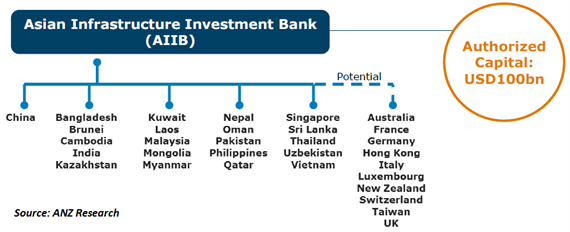-
The China-led Asian Infrastructure Investment Bank (AIIB) has become a focal point in global media headlines as some key European nations break ranks with the US and join up. Still, given its size and its newcomer status, the AIIB is unlikely to usurp existing organisations like the World Bank in the eyes of the world.
The emergence of the AIIB is positive news. There is a large need for infrastructure development in Asia. According to World Economic Forum, the infrastructure quality score of most Asian economies is on par with the world but is still well below average when compared with developed economies. In addition, infrastructure quality varies widely across the region.
"If done right, the rise of the AIIB could offer a new approach for Asia’s infrastructure financing."
Li-Gang Liu, ANZ Chief Economist, Greater ChinaThrough competition for projects from commercial enterprises, the AIIB will be able to bring about best practice to developing economies. As a result, recipient countries won’t be limited to Chinese technology and expertise but the process will bring more transparent and well-developed practice and policies from advanced economies. Therefore, the AIIB will potentially make the development experiences more broadly representative of global standards.
The initiative to establish the AIIB was first put forth by Chinese president Xi Jinping in October 2013. A year later, 21 Asian countries including China, India and Singapore, signed a Memorandum of Understanding on the establishment of the bank.
Meanwhile, the deadline for joining the AIIB as a founding member has been extended to March 31 this year. At the time of writing, 35 countries or economies have joined or expressed interest, including Australia, New Zealand, UK, France and Germany.
{CF_IMAGE}
The AIIB will have the same size of authorised capital ($US100 billion) as the proposed BRICS Development Bank of which China is also a founding member. In addition, China has set up the $US40 billion Silk Road Foundation to fund connectivity infrastructure projects around the Silk Road Economic Belt. These institutions could theoretically rival the World Bank, at least in size.
Although China may subscribe 50 per cent of the $US100bn capital roughly based on its economic size relative to that of other founding members, it is willing to dilute the shares it holds over time to accommodate new entries.
Emerging Asia accounts for almost half of the world’s infrastructure investment, indicating a major geographical shift of infrastructure spending from the West to East in the foreseeable future.
To satisfy this need and also to better deploy China’s huge foreign exchange reserves, China has clearly stated it sees the role of the AIIB as providing financing for infrastructure needs in Asia.
This will allow large commercial interests to compete for many potential projects in the Asian Pacific region as they have done in many such infrastructure programs with the World Bank and ADB. Given the potential loans to be extended, the infrastructure related business could be as large as $US30 billion.
As more developed countries join the AIIB, firms in member countries can bid for these projects. Without the participation of developed countries, it is very likely that many such projects could fall into the hands of Chinese firms.
Despite the intrusion of the AIIB, it is unlikely to be a rival to institutions like the World Bank, because of the size and status of the established global players.
Indeed, the AIIB will complement existing institutions and it is hoped, with increased competition in development financing business, China could share its successful experiences in developing infrastructure. If done right, the rise of the AIIB could offer a new approach for Asia’s infrastructure financing.
Li-Gang Liu is ANZ ‘s Chief Economist, Greater China
The views and opinions expressed in this communication are those of the author and may not necessarily state or reflect those of ANZ.
-
EDITOR'S PICKS
-
One of the first sights a visitor enjoys of Singapore is one of the earliest policies introduced by Singapore first prime minister, Lee Kuan Yew, to promote the country as a world class city and disciplined economy.
24 March 2015 -
Gold, for centuries the object of fascination and desire, a store of wealth and bedazzling jewellery, has had a wild ride in the last decade and particularly recent years. In the long term though, according to a new report by ANZ Research 'East to El Dorado: Asia and the future of gold', it will continue to glitter.
18 March 2015 -
I am often asked what makes the China Australia Free Trade Agreement (ChAFTA) so special. There are varying views as to why.
18 March 2015

